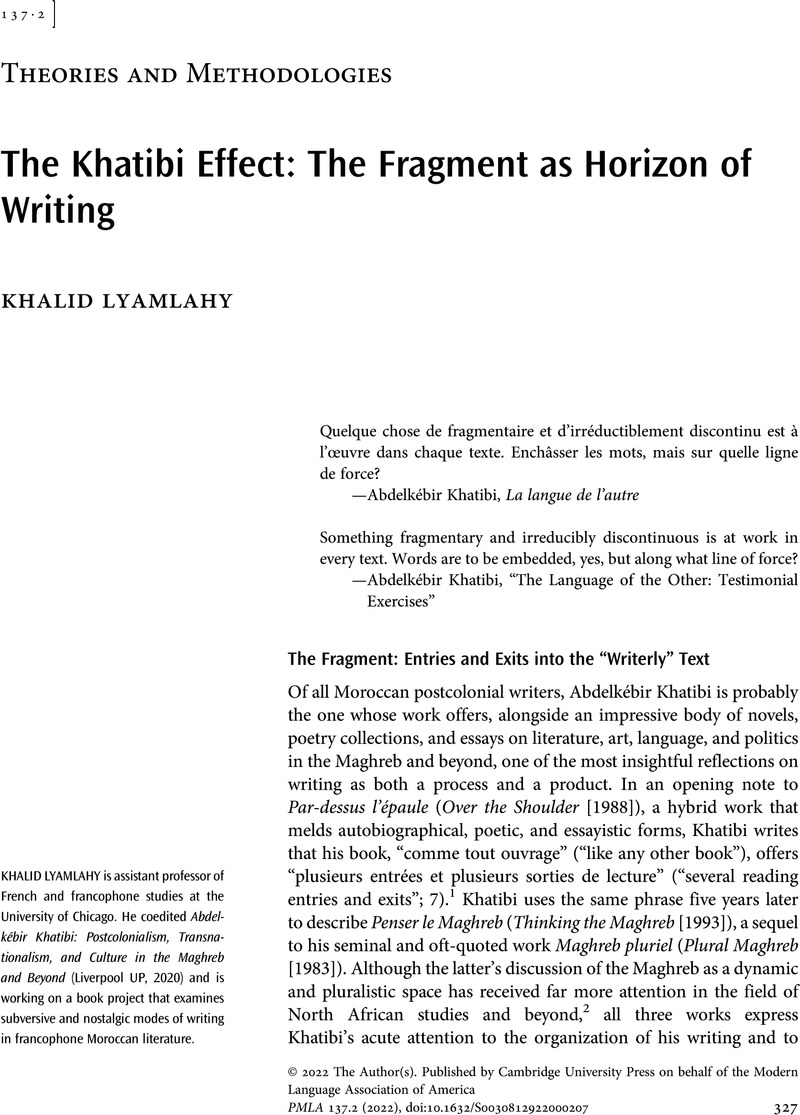No CrossRef data available.
Article contents
The Khatibi Effect: The Fragment as Horizon of Writing
Published online by Cambridge University Press: 25 May 2022
Abstract
An abstract is not available for this content so a preview has been provided. Please use the Get access link above for information on how to access this content.

- Type
- Theories and Methodologies
- Information
- Copyright
- Copyright © 2022 The Author(s). Published by Cambridge University Press on behalf of the Modern Language Association of America
References
Works Cited
Abdi, Noureddine, et al. “Présentation.” Du Maghreb, special issue of Les temps modernes, 375 bis, Oct. 1977, pp. 5–6.Google Scholar
Barthes, Roland. “Ce que je dois à Khatibi.” Œuvres complètes V: 1977–1980, Seuil, 2002, pp. 666–67.Google Scholar
Barthes, Roland. La préparation du roman I et II: Cours et séminaires au Collège de France, 1978–1979 et 1979–1980. Seuil/IMEC, 2003.Google Scholar
Barthes, Roland. The Preparation of the Novel: Lecture Courses and Seminars at the Collège de France, 1978–1979 and 1979–1980. Translated by Briggs, Kate, Columbia UP, 2010.Google Scholar
Barthes, Roland. “Les sorties du texte.” Œuvres complètes IV: 1972–1976. Seuil, 2002, pp. 366–76.Google Scholar
Bensmaïa, Réda. The Barthes Effect: The Essay as Reflective Text. U of Minnesota P, 1987.Google Scholar
Bensmaïa, Réda. Experimental Nations; or, The Invention of the Maghreb. Translated by Waters, Alyson, Princeton UP, 2003.Google Scholar
elhariry, yasser. “Snap! Blow! The Consensus of Thinking.” Review of Class Warrior—Taoist Style, by Abdelkébir Khatibi, translated by Matt Reeck. Jacket 2, 6 Sept. 2019, jacket2.org/reviews/snap-blow-consensus-thinking.Google Scholar
Harrison, Olivia C. Transcolonial Maghreb: Imagining Palestine in the Era of Decolonization. Stanford UP, 2015.CrossRefGoogle Scholar
Hiddleston, Jane, and Lyamlahy, Khalid. “Abdelkébir Khatibi, at Home and Abroad.” Introduction. Hiddleston and Lyamlahy, Abdelkébir Khatibi, pp. 1–38.CrossRefGoogle Scholar
Hiddleston, Jane, and Lyamlahy, Khalid. editors. Abdelkébir Khatibi: Postcolonialism, Transnationalism, and Culture in the Maghreb and Beyond. Liverpool UP, 2020.Google Scholar
Kelly, Debra. Autobiography and Independence: Self and Identity in North African Writing. Liverpool UP, 2020.Google Scholar
Khatibi, Abdelkébir. Cover copy. Khatibi, Maghreb pluriel.Google Scholar
Khatibi, Abdelkébir. Figures de l’étranger dans la littérature française. Denoël, 1987.Google Scholar
Khatibi, Abdelkébir. “The Language of the Other: Testimonial Exercises.” Translated by Catherine Porter, PMLA, vol. 125, no. 4, Oct. 2010, pp. 1002–19.CrossRefGoogle Scholar
Khatibi, Abdelkébir. “La mémoire tatouée.” Œuvres de Abdelkébir Khatibi I: Romans et récits, La Différence, 2008, pp. 9–113.Google Scholar
Khatibi, Abdelkébir. “Ombres japonaises.” Œuvres de Abdelkébir Khatibi III: Essais, La Différence, 2008, pp. 207–24.Google Scholar
Khatibi, Abdelkébir. Tattooed Memory. Translated by Thompson, Peter, L'Harmattan, 2016.Google Scholar
Khatibi, Abdelkébir. Vomito blanco: Le sionisme et la conscience malheureuse. Union Générale d'Éditions, 1974.Google Scholar
Lyamlahy, Khalid. “With Barthes and Derrida in ‘the Margins of a Funereal Song’: The Poetics of Maternal Mourning in the Work of Abdelkébir Khatibi.” Variations on the Ethics of Mourning in Modern Literature in French, edited by Cooper, Sara-Louise and Bourne-Taylor, Carole, Peter Lang, 2021, pp. 152–83.Google Scholar
McNeece, Lucy Stone. “Decolonizing the Sign: Language and Identity in Abdelkebir Khatibi's La mémoire tatouée.” Post/colonial Conditions: Exiles, Migrations, and Nomadisms, special issue of Yale French Studies, vol. 2, no. 83, 1993, pp. 12–29.Google Scholar
Mignolo, Walter. Local Histories, Global Designs: Coloniality, Subaltern Knowledge, and Border Thinking. Princeton UP, 2012.Google Scholar
Reeck, Matt. “Excerpts from Abdelkébir Khatibi, La blessure du nom propre (Paris: Denoël, 1974).” Hiddleston and Lyamlahy, Abdelkébir Khatibi, pp. 329–46.Google Scholar
Richman, Michèle. Foreword. Bensmaïa, Barthes Effect, pp. viii–xxi.Google Scholar
Sheringham, Michael. “Writing the Present: Notation in Barthes's Collège de France Lectures.” Signs Systems Studies, vol. 36, no. 1, 2008, pp. 11–30.CrossRefGoogle Scholar
Stafford, Andy. “The ‘Souverainement Orphelin’ of Abdelkébir Khatibi's Early Writing: Sociology in the Souffles Years.” Hiddleston and Lyamlahy, Abdelkébir Khatibi, pp. 41–64.CrossRefGoogle Scholar


